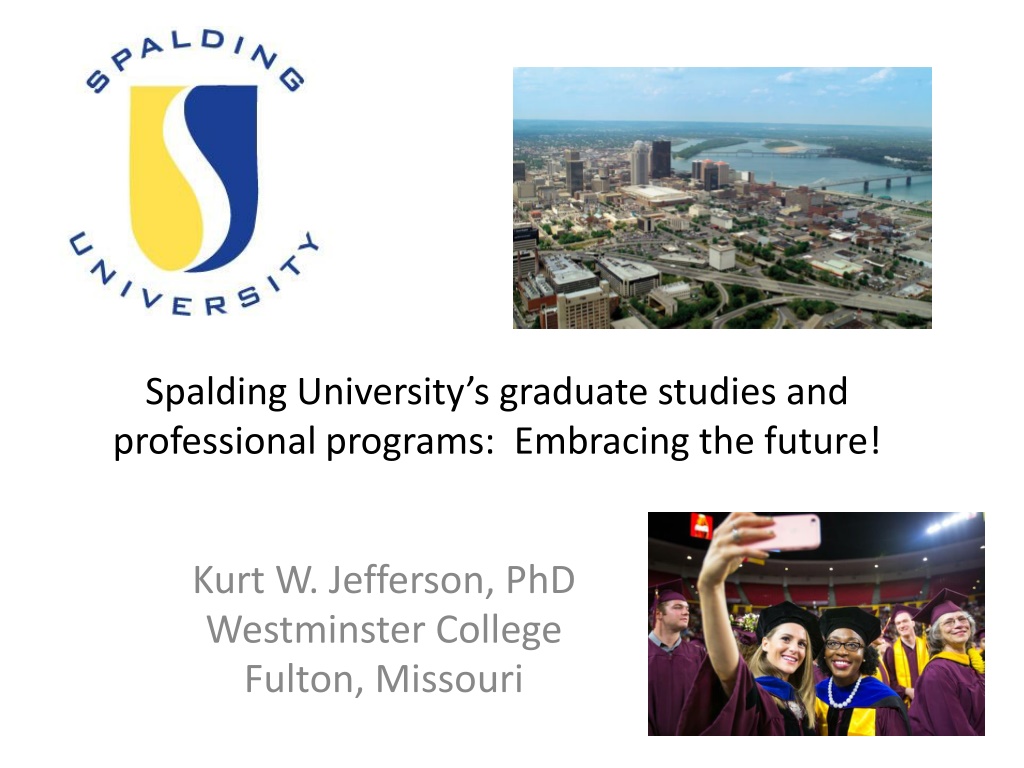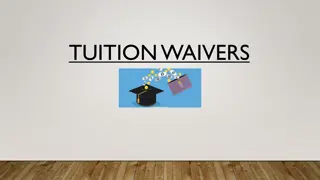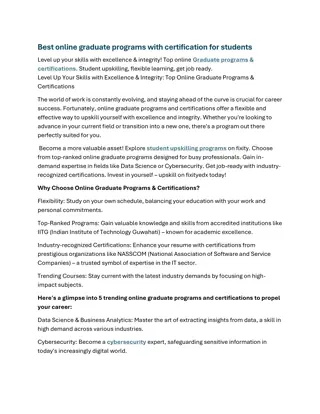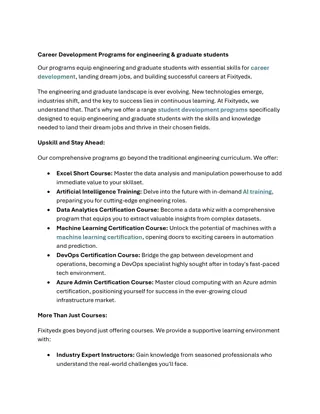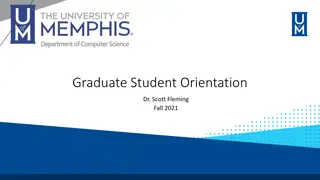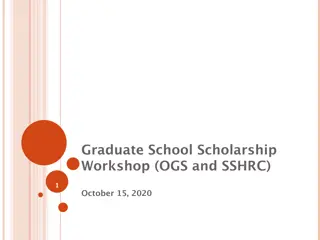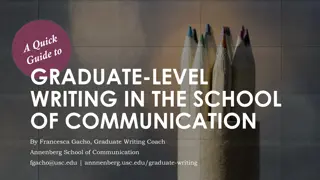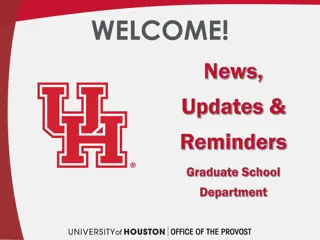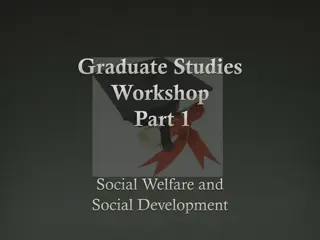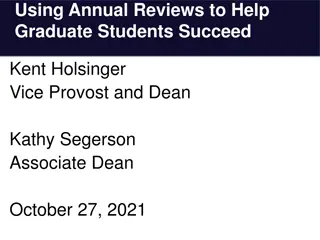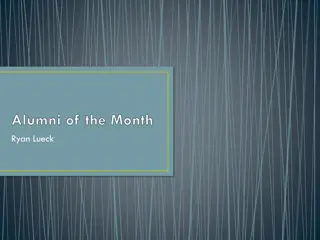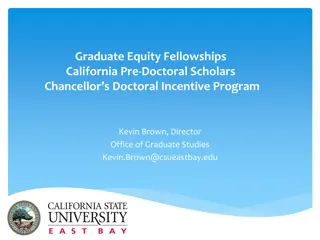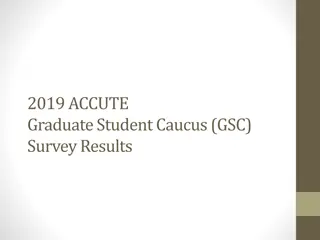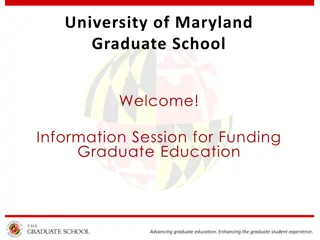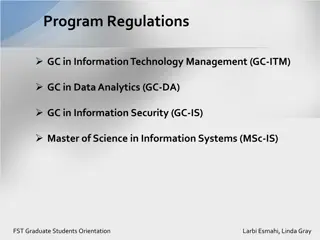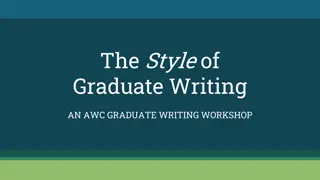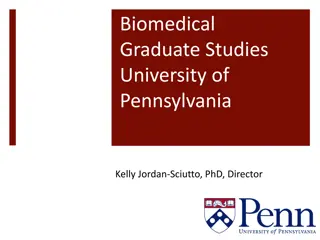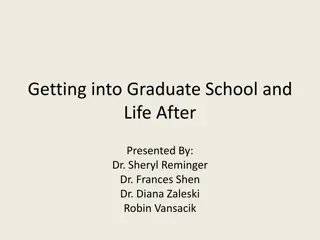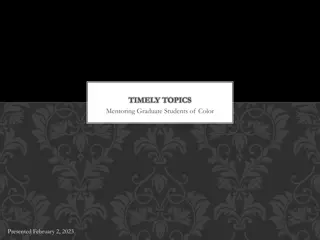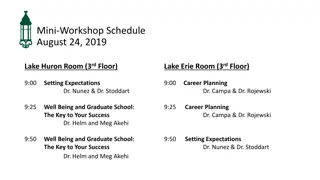Embracing the Future: Spalding University's Graduate Studies and Professional Programs
Spalding University is investing in graduate and professional studies to meet the growing demand and provide value-added benefits to students and the community. By expanding its offerings and staying mission-focused, the university aims to enhance its prestige, promote interdisciplinary learning, and cater to high-demand areas such as business, psychology, technology, and healthcare.
- Spalding University
- Graduate Studies
- Professional Programs
- Interdisciplinary Learning
- Higher Education
Download Presentation

Please find below an Image/Link to download the presentation.
The content on the website is provided AS IS for your information and personal use only. It may not be sold, licensed, or shared on other websites without obtaining consent from the author. Download presentation by click this link. If you encounter any issues during the download, it is possible that the publisher has removed the file from their server.
E N D
Presentation Transcript
Spalding Universitys graduate studies and professional programs: Embracing the future! Kurt W. Jefferson, PhD Westminster College Fulton, Missouri
Outline of this talk: Importance of the investment by Spalding University in graduate and professional studies? What s the local market say regarding graduate studies? Interdisciplinarity and Transdisciplinarity: how to connect new areas for advanced higher education Collaborations at Spalding: practice/applications and outcomes Recruitment Expanding the Spalding brand and broadening the footprint in Louisville and beyond (and staying missional) How the Dean s office could be conceptualized and the initial agenda: hitting the ground running! Spalding s future and the graduate studies area
Why should Spalding invest deeper in graduate studies? Graduate and professional studies are growing for institutions like Spalding (for most institutions it s not a matter of when or how, it s now and plow sow the seeds of graduate and professional studies growth today and a yield will begin once cultivation takes place.) Master s degrees more than doubling over last two decades (to 750,000 by2007) and 35,000 graduate certificates granted in 2014 (Gumport, 2016). High demand areas of graduate and professional study growing: Business, psychology, technology, and healthcare (Gumport, 2016). Normative assumptions that students want to complete initial bachelor- level training with more finely tailored master s degree to increase competitiveness and job options in the marketplace (Gumport, 2016). Additional revenue streams for the institution. (Continued on next slide) - - - -
Why should Spalding invest in graduate studies? (continued) - Value-addeds: Enhances prestige of the university and demonstrates a deep commitment to both intellectual and professional development of students and the community (along with partner organizations/businesses that provide financial assistance for graduate and professional students) Provides a plat-form for intentional and increasingly integrated use of on-line technologies which are not only fast becoming a significant part of the landscape in higher education (5m UG students taking at least one on-line/hybrid 11% and 650,000 graduate/professional 22%) in 2015 (Blumenstyk, 2015). Fills a need in the market in Louisville and the area (and potentially on-line and globally) (e.g. a Masters in Physician Assistant Studies or an enrichment leadership masters or a transdisciplinary and interdisciplinary data analytics masters or interdisciplinary global studies MA or security studies MA or MA in social justice leadership for the non-profit sector). Fits the Spalding culture of quality university education for diverse populations and those that need greater access to higher education in both undergraduate and graduate settings. - - - -
The local market for graduate studies Louisville, Kentucky is the 30thlargest city in the US. It is the largest city in KY (600,000) and the metro area is 1.28m people. It has grown 3.9% in the past six years. It is gaining 146 people a week (Louisville Business First, March 23, 2017). It is one of the fastest growing cities (top 15) in the US. Forbes ranked it, in 2016, as #54 (of top 100 cities in US) as best place for business and careers. (Forbes.com) ahead of Kansas City (largest city in Missouri), San Antonio (second largest city in Texas), Chicago and Houston (largest city in Texas) to name a few. Major sectors: healthcare, education, food/beverage, distribution/transportation, tourism, energy (hydro, solar, electricity), technology, military, security-related, and human services. Competition: U of L, Bellarmine, Indiana Wesleyan, Sullivan (for-profit), U of Kentucky. Good news is that it is not as saturated a market as many other cities its size (St. Louis, Kansas City).
Direct Competitors in market Indiana Wesleyan: Direct competition in several areas, nursing, communication, education (even though a 501c3, IWU has modeled itself off the Grand Canyon U. model) Bellarmine U.: Direct competition in some areas (education, nursing); independent Catholic institution U of L: full-service masters and doctorates in many areas (plus dentistry, medicine, law) putting lots of eggs into interdisciplinary studies masters with lots of concentrations in disparate areas. Sullivan U.: For-profit institution only one, to my knowledge, with MSPAS (big market coming in this area).
Spalding U. in the market (continued) You have 1000 graduate students (a very good start) You can grow in significant ways Need to work off a strategic plan and be intentional about growth and be inclusive (in terms of college/departmental participation and ownership of programs) A certain amount of market testing and validation is needed for existing and new programs Experimentation is not always a bad thing (some masters programs may be meant for a specific sunrise and sunset-5 to 10 years or shorter due to faculty specializations and department goals and objectives; e.g. double masters program that I participated in as a teacher in France). Also, some graduate programs may need to be expanded based on the same variables. Spalding s reputation and mission will always allow for it to have a perceived and real value in the market given its identity, reach to all populations in Louisville, and its mission. But, moving it deeper into Louisville and outside of Louisville into military bases, smaller communities, and into, potentially, other competitive markets in Kentucky, Indiana, Ohio (e.g. Louisville, Fort Knox, Kentucky Air National Guard, Bardstown, Radcliff, Frankfort, Elizabethtown, etc.)
Interdisciplinarity & Transdisciplinarity I have seven years experience chairing two interdisciplinary bachelor degrees: international studies and transnational studies. The former a regional/area studies major and the latter a global issues (that seep over transnational borders) major Interdisciplinary majors provide nice connections between disciplines, new ways to look at problems, new ways to solve problems, and new conceptualizations that meet the needs of the 21stcentury learner (environmental studies, security studies, data mining, social justice, financial literacy, health sciences, applied behavioral studies, etc.) Transdisciplinarity allows for questions of scholarly, empirical, and normative importance to be viewed as a whole from a trans or even meta-disciplinary standpoint: Areas of inquiry like broad wicked problems (internet/cyber/social media terrorism, climate issues, educational paradigms, nursing and health in a global perspective, leadership in for-profit and non-profit organizations can all be studied from this perspective which will tie disciplines together holistically and bring new outcomes in terms of ideas and solutions to the table in delivering content and ways of thinking to students (e.g. a course in transnational wicked problems or innovation and creativity are interdisciplinary and transdisciplinary).
21stCentury Problem-solving and interdisciplinary approaches: 3 examples The issues and problems that our world faces will be solved through interdisciplinary methods and approaches in the 21stCentury Arizona State University now has pedagogical and research spaces aligned by the issues/research areas-questions under investigation not by discipline (and physical labs and spaces are made in concentric ways to overlap social, humanistic, and scientific scholars and teachers to provide eco- systems that bring out methodological, conceptual, and ideational synergies rather than separation via disciplinary stovepipes. The Israeli government created an elite military unit, Talpiot (meaning tower ), to bring the best minds to study broad questions of economic, security, geography, math, science, and engineering in order to connect R & D to the military and then this overlaps into the budding entrepreneurial culture dealing with food, water, business, environmental, and engineering issues in building a modern, information economy. Healthinformatics is a burgeoning field that combines basic knowledge of health sciences, information systems and management, administrative and computer applications, and knowledge of social systems as they relate to healthcare both narrowly and broadly defined. For hospital CEOs and other administrators, healthinformatics can be a good help in understanding interdisciplinary challenges to all systems within the wider healthcare eco-system of a hospital or health corporation and connecting HR, physicians, laboratories, health equipment, business services, IT, and government compliance and ultimately to forecasting broader global healthcare issues and problems allows this area to fine to assessments and feedback to make healthcare more understandable empirically and strategically.
Deeper Collaborations/new grad program ideas Combined grants for employing graduate students on campus (e.g. WIU has an NSF grant for its biology/chemistry programs: summer lab work for graduate and UG students; one-a-month colloquia/brown bag on a professor s research that is used to recruit UG students (and give grad students a forum to mentor UG students as well) Think about synergies in potential graduate programs: such as environmental studies/sustainability (writing, sciences, history, business, etc.) the Ohio River valley will need leaders in water management and conservation as will the US and world. Security studies (business, psychology, history, computer science, etc.) link to mission: access to security for the poor in Louisville plus practical security masters degrees for security leaders in Louisville and military bases (Fort Knox) Cognitive science: holistic integration of anthropology, sociology, psychology, and natural/physical sciences in connecting social and cultural trends to psychological and health related areas (as well as cyber/digital areas concerns about cell phone/social media addiction, healthy respect for science, scientific thinking, etc.) Health areas for graduate/professional consideration: Masters of Physician Assistant Studies only Sullivan University (in Louisville), UK, and U of Cumberlands offers this in KY (Sullivan for profit you are more reputable and a better economical option) (maybe a doctorate?); health informatics Masters of Leadership (out of organizational development in the College of Business) may serve as a liberal arts collaboration with business in a more general leadership program rather than an MBA. Global Studies masters as an enrichment degree with a humanities/social science/science bent (global issues global climate, global financial, global disease, global governance, globalization, and local to global connections (in Louisville) many wanting an enrichment degree in corporate Louisville might find this of interest (rather than a masters in their own field) Financial literacy, financial counseling: Growing areas of gaining advanced study in personal financial counseling and planning not only for CFPs but for those with an interest in combining social work with financial counseling (an in-demand field today). 1) 2) 3) 4) 5) 6) 7)
Practice/Application of existing and new graduate programs Continue to grow existing graduate and professional programs at MA, MS, PsyD, EdD, DNP, MSN, MFA Move to offer 1-2 new fully on-line masters programs in next 12-18 months. Choose existing program to link in-class, hybrid, and fully on- line will provide access to those that can t get to campus Consider cohort systems in actual businesses and in some branch locations (military base for NCOs) Add two graduate certificates in next 12-18 months Up branding and public relations splash in Louisville and other markets Engage in assessment and reflective practice of what is working and what is not in various graduate programs (staffing, funding, course sequencing, student recruitment) Consider new interdisciplinary and professional graduate/professional degree programs and even tracks in existing graduate programs (e.g. MSPAS, Social Justice leadership for non-profits, security studies masters, sustainability administration, etc.)
Expanding the Spalding U. footprint/visibility in Louisville and beyond Know your competition! Mentioned above Compete on your terms (do what you do best)-but don t be afraid to step out into new territory (both in graduate programs and in physical locations) Marketing and recruitment are key (build the team and expand the brand) Set goals via strategic planning: Many schools setting immediate, bold goals Utilize technology and start cohort model in a new location (military bases; cities of 30,000-50,000 such as Bardstown or other cities with no real graduate studies presence (and this could help continuing ed and UG degree-completion programs at Spalding too), and start at least 1-2 fully on-line masters program in the next 18- 20 months) Graduate Studies Dean begins to build the community relations in Louisville corporate culture one night a month I will offer a seminar on global issues/leadership with junior and senior executives of for-profits and non-profits Start a graduate student advisory council working with me to get graduate student input (a must) Start value-added recognitions programs such as yearly scholarship/recognitions dinner where small scholarships given for outstanding grad students, awards for top graduate faculty, awards for support staff (graduate student advising, support, etc.) mentioned in a slide below. Build connection with admissions area to build a systematic graduate recruitment system (this isn t easy) build off what is in place now and make it a process with dates, cycles, and cohort building (and identifiable prospects). Work with Deans and Dept Chairs at Spalding to build graduate studies academic eco-system and graduate student eco-system of support and cultivation (close the loop) Sow the Spalding mission: CARING, COMPASSIONATE, SOCIAL JUSTICE, IT S ABOUT YOU, THE STUDENT your investment will yield not only advanced skills but a new purpose in your chosen career and life! No other institution is focused and as missional as you. This message will resonate as you balance practical professional programs with Don t forget it is an executive s mission to care about his/her workers and his/her organization FIRST! Like U. of Notre Dame, you can utilize this mission to build your academic and community reputation. Build relationships: I will do this as Graduate Studies Dean and continue to tell the story with purpose and pride!
Hitting the ground running! Learn Spalding system (provost, deans, chairs, etc. agendas and their stories in terms of where they are with their organizations in leading faculty and students) sit on various councils and committees with them Learn the graduate studies system. Work with graduate studies team members to understand nuts-n-bolts (teaching components, adjuncts, FTE faculty, courses, programs, course scheduling, catalog, registrar, admissions/retention, budget, accreditation (SACS), etc. All of this is the daily/weekly managerial part of the Graduate Studies Deanship. Learn personnel system, evaluation, compliance, risk management, legal environment, campus-wide policies, working with provost, president, and cabinet. Start visioning process with immediate team and extended teams (deans, chairs, cabinet, student life team, etc.) and immediate victories: Build graduate student culture: graduate student advisory council; graduate student-specific career services elements; graduate student honors and scholarship recognition; faculty graduate instructor development and recognition; international student recruitment and expansion (working with admissions and connecting to on- line programming as well) Community action connecting with Chamber, corporate leaders, building partnerships, and engaging community from Day 1 Fundraising (build in to strategic plan) start the friendraising (work with Development office get on same page) Start research on strategic planning team (after first semester or even first 9 months) based on getting to know team and then hopefully 2018-19 will be start of strategic planning process (although some components can start in 2017-18). Build assessment culture (for quality assurance and improvement indicators to build on successes and learn from failures) Create effective communication system in graduate studies office (work with executive assistant and team members to create this includes weekly meetings and updates and accountability plans for all of us including me as Dean). 1) 2) 3)
Spalding Universitys future 40% of all higher ed institutions are under 1000 students today in the US 40% are 5000 to 1000 students (Selingo, 2016). Institutions over 10,000 students have grown slightly (Selingo, 2016). 60% of revenue comes from tuition dollars (on average) for schools of 5000 or less (Selingo, 2016). Top 15 graduate areas for jobs (according to Fortune2016): 11 of top 15 areas are relevant for the Louisville job market (biostats, stats, computer science, pharmacy, math, chemistry, information systems, physician assistant, MBA most in the STEM fields). Keeping up with Joneses versus trailblazing versus doing nothing: Many institutions join the graduate market to keep up with competition. Many find a niche and move toward it (aviation or sustainability or agriculture or journalism). And, some do nothing worried that traditional liberal arts will be undermined or that others have taken the market from them and then a self-fulfilling prophecy occurs (we can t join the grad market because we are going to get beat since school X already has a _______ grade program). Spalding is in the market with 12 quality graduate programs (U of L offers 134, Bellarmine offers 20 with 3 fully on-line, and IWU offers 10 graduate programs). With careful planning, Spalding can: 1) Expand its programming and carve out a niche in the local market in grad and professional studies (and global market via hybrid and on-line) 2) Spalding can do more on-line in remote areas near Louisville (which will expand rising tide lifts all boats non-degree/continuing ed programs and degree completion (UG) degree programs as well (this should be a synergy between Spalding graduate programs and continuing ed 3) Spalding can contrast itself as accessible (based on its mission), affordable, and practical (in many applied graduate areas) as well as develop some traditional graduate programs that are interdisciplinary and assist certain professionals in becoming thought leaders in their fields (cognitive sciences, big data, transnational justice, etc.) 4) Spalding can build its own internal profile as it grows its UG and Grad/Professional areas to become the private Catholic and urban university for Louisville and the surrounding area. 5) Most importantly, it will be an attractive place for potential faculty and staff to work given the development of a graduate student and graduate academic/intellectual culture and it will attract top students who want to study with interpersonal attention and care (missional) 1) 2) 3)
My experience and vision Like Spalding, I come from a smaller institution with a long history Like Spalding s new Dean of Graduate Studies, I built the Churchill Institute from the bottom up as a extremely new area in the institution Like Spalding, the mission of Westminster is to offer an outstanding academic program that creates leaders of success, significance, and service I have much administrative experience, teaching experience, and scholarly experience. I ve taught and collaborated with graduate schools in several institutions and help develop and bring value-added outcomes to their institutions My leadership skills are transferable and as an entrepreneurial thinker and leader, I can bring solutions and ideas that help position the graduate studies at Spalding in a market that is competitive, yet ready for deeper penetration by Spalding University since it has offers a unique set of experiences and an identity that others don t have (missional service and compassionate concern for others that organizations are looking for leaders in many organizations are focused less on others than themselves today; Spalding is in direct contrast to that mantra and Spalding s mission is refreshing and much needed in the age in which we live.) Private higher education has been my space for 27 years and this is why I believe in it wholeheartedly and can deliver experience and results in leading this important area of growth and revenue enhancement for Spalding, in my opinion.
Thank you! I appreciate the opportunity to interact with you and let you know my thoughts on this important leadership position. Thank you for taking the time to watch/listen and evaluate my vision and work. I look forward to hearing from you.
Slide References Spalding U. logo (wikipedia.org) (Slide 1) City of Louisville photo (http://farm2.static.flickr.com/1424/5099850656_35a8e1b6fb_b.jpg) (Slide 1) Graduation photo (https://asunow.asu.edu/20160509-sun-devil-life-graduation-convocations-gallery) (Slide 1)
